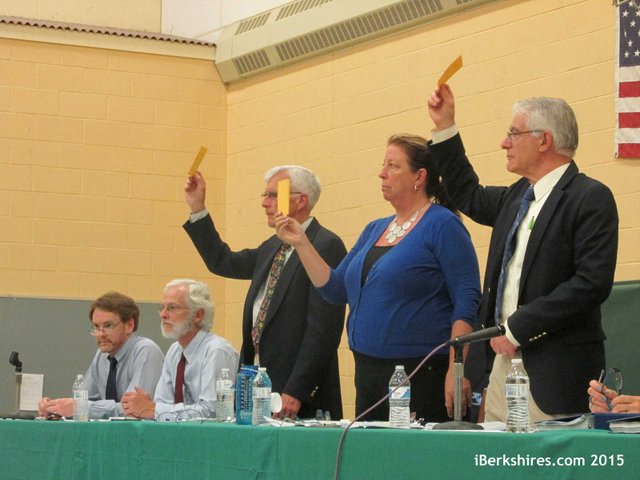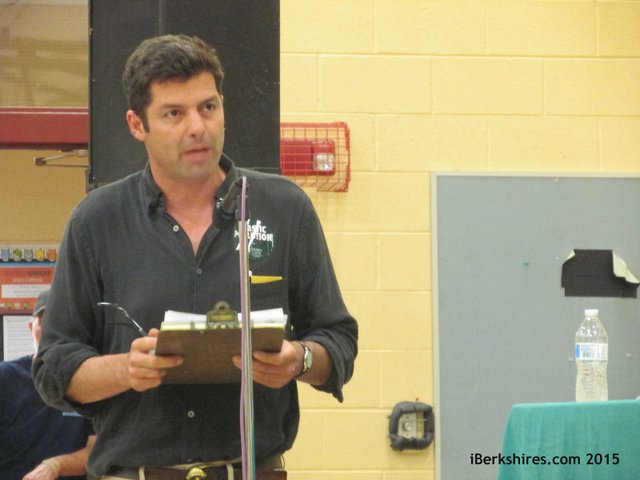Williamstown Voters to Shoppers: Bring Your Own BagBy Stephen Dravis, iBerkshires Staff
12:24AM / Wednesday, May 20, 2015 | |
 Selectmen Thomas Sheldon, Jane Patton and Ronald Turbin vote for the anti-plastic bag bylaw. Selectmen Hugh Daley and Andrew Hogeland voted with the minority of town voters against the ban, urging more opportunity for community input. Selectmen Thomas Sheldon, Jane Patton and Ronald Turbin vote for the anti-plastic bag bylaw. Selectmen Hugh Daley and Andrew Hogeland voted with the minority of town voters against the ban, urging more opportunity for community input. |
WILLIAMSTOWN, Mass. — Town meeting on Tuesday evening passed bylaws to ban the distribution of single-use plastic bags and polystyrene food containers at retail establishments.
By a vote of 205-81, town voters passed Article 41 on the annual town meeting warrant that called for the ban on single-use bags and a mandatory fee of 10 cents per paper bag distributed by local retailers.
Voters then passed a companion bylaw aimed at polystyrene packages by a voice vote.
But first, town voters rejected a proposal by the Board of Selectmen to refer both of the proposed bylaws to committee.
That proposal generated the closest votes of the nearly three-hour meeting.
On the first bylaw to come up, the plastic bag ban, the motion to refer to committee was defeated, 166-128, after the chairman of the Board of Selectmen, Ronald Turbin, announced that he had changed his mind on the plan to study the bylaws further and was throwing his support behind passage at town meeting.
On the polystyrene ban, the motion to send to committee was voted down, 176-94.
The Board of Selectmen split 3-2 on the final vote on the bag bylaw. Andrew Hogeland and Hugh Daley voted against its passage; Turbin, Thomas Sheldon and Jane Patton voted with the majority in favor of passage.
Both bylaws, which were drafted by an ad hoc committee of concerned citizens, were modified on the floor of town meeting.
After introducing the legislation, the group's spokesman, Brad Verter, introduced a long list of amendments — the most significant of which struck language from the plastic bag bylaw allowing criminal prosecution of violations (similar language was later cut from the polystyrene bylaw).
The litany of amendments prompted resident Harry Montgomery to comment from the floor that the bylaw "wasn't ready for prime time."
That impression did concern Verter as the debate wore on.
"I [suggested the amendments] because one of the Selectmen who was opposed to the bylaw said that these were some of the things that were his concerns about it," Verter said. "I wanted to address as many of his concerns as possible.
"But I was afraid that it might give a signal to the voters that, as [Montgomery] said, it wasn't 'ready for prime time.' The reason for it was the law was an amalgamation of the best language from other laws. They used other terms, and my proofreading skills are not as strong as I hoped."
In the end, Verter was gratified with the strong response from the 324 voters who checked in to the annual town meeting (7 percent of the 4,581 registered voters).
"I thought it was a very good meeting in that both sides had a chance to express their best case, and I think the voters' decision is a clear mandate that we want our community to go forward with these two bylaws," he said. "I think it's very exciting for not only the Town of Williamstown but for the Berkshires and the state of Massachusetts."
Both Daley and Hogeland spoke from the floor to advocate in favor of taking time to develop stronger bylaws in committee.
"The Selectmen have gone on record supporting the goal and intent of the article," he said in discussing the bag ban. "We're not here to vote on good intentions. We're here to vote on the letter of the law.
"We should demand that our bylaws are written in open and posted meetings with the opportunity for participation from all citizens."
Daley said the community organizing meetings held by Verter's group are "not equivalent to a Selectmen's meeting or a zoning law meeting where the Open Meeting Law is enforced and records are kept."
"That procedure was put in place to hold elected officials accountable to our citizens," Daley continued.
And Daley and Hogeland were not the only ones arguing from the floor against passage.
"If we really want to affect the contents of our landfills, we need a broader capture region," said Anne Skinner, who stressed she was speaking as one citizen, not representing the League of Women Voters. "A statewide ban would be actually very helpful in this respect.
"I do recognize the tactic being used here to use support in the towns to put pressure on the Legislature. But with 17 towns out of 351, you have a long way to go on that one."
Local businesswoman Amy Bryan objected to the punitive aspects of the law, which would hurt small-business owners, she said.
 Brad Verter addresses town meeting on the plastic bag bylaw that overwhelmingly passed. Brad Verter addresses town meeting on the plastic bag bylaw that overwhelmingly passed. |
"If my sister-in-law came in and I didn't charge her for a bag — first time a warning, second time $50, third time $100," she said. "I urge you to refer this to the Selectmen to draft a law that would be fairer to the businesses.
"I fully support getting rid of plastic, but the law as written doesn't support small businesses in town."
Wendy Penner of the town's COOL (Carbon Dioxide Lowering Committee) spoke in favor of the bylaws and specifically addressed one of Bryan's concerns.
"I think we can assume it would only be enforced if a business was flagrantly violating the law," Penner said. "If you have a family member [get a bag], I don't think these are cases where people will want to rush in and be punitive."
Bag bylaw proponents also emphasize that the the 10-cent per bag fee on paper bags is, by design, not intended to come out of retailers' pockets but to fall directly on consumers.
"The goal is to change consumer behavior," Susan Abrams said. "The goal is to encourage people to bring reusable bags. ... When you charge a fee, and they can't get a bag for free, there is more incentive."
After the bag bylaw passed by a solid 205-81 majority, Daley took another stab at getting voters to refer the polystyrene bylaw to committee.
"There is a dangerous assumption embedded in both these bylaws that costs do not matter," Daley said. "Businesses are extremely cost conscious, and consumers are extremely cost conscious. It is a dangerous assumption that volume will stay the same if you keep increasing prices
"The town deserves the opportunity to vote on a bylaw that has been checked by Town Counsel. We're commmitted to doing that."
Daley's and Verter's were the only voices heard on the polystyrene question. The motion to send to committee was called immediately after Daley's remark, failing 176-94. Then the main motion passed by a voice vote.
In other business on Tuesday, annual town meeting approved the main appropriations in the budget by unanimous voice vote: the $7.1 million town budget, the $5.8 million appropriation to Williamstown Elementary School and the nearly $5 million appropriation to Mount Greylock Regional School.
The town also passed a new bylaw governing installation of ground-mounted solar photovoltaics and a series of amendments to the town's sign bylaw aimed at making it less restrictive and friendlier to business.
More on Williamstown's annual town meeting to come.
| 
 MEMBER SIGN IN
MEMBER SIGN IN
 MEMBER SIGN IN
MEMBER SIGN IN